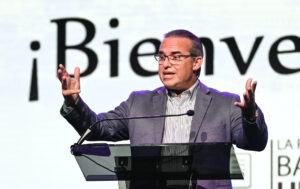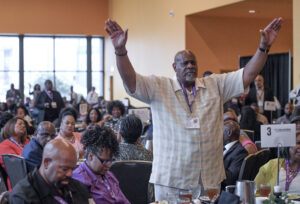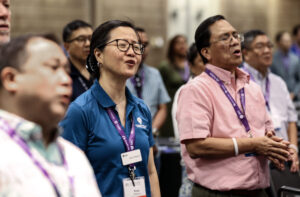
NASHVILLE (BP)–A groundbreaking television documentary that is sure to make ripples, if not waves, during this election season zeroed in on President George W. Bush’s faith in Jesus Christ and tapped a Southern Baptist entity’s chief executive, who is an outside-the-Beltway insider, for his thoughts. Yet a storm of discussion triggered by an edit of the SBC exec’s comments on Bush’s decision to run for the presidency competed with press coverage of the program itself.
“The Jesus Factor,” a “Frontline” documentary that looked at Bush’s religious convictions and their relationship to his role as president, aired April 29 on many public television stations. Richard Land, president of the SBC’s Ethics & Religious Liberty Commission, was interviewed for the Frontline program on his perspective of Bush’s blending of his faith and his political life. Land was a friend of both the president and his advisor, Karl Rove, years before either went to the White House.
While Land said the program was a “decent attempt” to examine the president as a “man of faith” and “how his faith interacts with his public service,” the program’s producers stumbled in putting the program together.
In the midst of more than five hours of interviews Frontline did with Land were five sentences out of which the program’s producers decided to pull two for a particular segment: “The day he was inaugurated for his second term as governor in 1999, there were several of us who met with him at the governor’s mansion. Among the things he said to us was: ‘I believe that God wants me to be president.'”
That single line garnered considerable press coverage before the Frontline program aired. PBS had issued a news release and, apparently, some major media outlets were allowed an advance screening of the show.
The problem is that the statement was not all of what Land said about the comments by Bush. By editing his statement the way they did, Land said PBS “distorted the meaning and the whole ethos behind the quote.”
“What the president said was, ‘I believe that God wants me to be president, but if that doesn’t happen, that’s OK. I am loved at home, and that’s more important,” Land explained on National Public Radio’s “Fresh Air” program April 29. He noted transcripts of his interviews with Frontline producers were available on the Internet at www.pbs.org.
Bush noted he had “seen the presidency up close and personal” and recognized it as a “sacrifice, not a reward,” Land continued.
“I don’t need it for personal validation,” Land recalled Bush saying. He said he remembered the governor’s statement word-for-word because he was “so struck by the humility of it” as well as the “combination of conviction and humility.”
“I still believe that is the essence of George W. Bush’s approach to God’s will for his life and his public service,” Land said.
Land, clearly displeased with the impression left from the clipped quotation, even asked the host of Fresh Air, Terry Gross, during the taping of her program, if she appreciated how the truncation of his quote changed its meaning. Responded Gross: “In all honesty, I think it’s the first sentence that people were most concerned with.” Perhaps, Land responded to Gross, “This was a point at which the Frontline producers’ perspectives interfered with fair and balanced reporting.”
Land told Baptist Press that the controversy the partial quote generated is nonetheless symptomatic of where many in America are today. “Does anyone think Jimmy Carter didn’t believe God wanted him to be president? Why else would he run as a ‘born-again’ Christian? And what about Ronald Reagan or Woodrow Wilson, two other self-professedly religious presidents? Does anyone believe they didn’t think God wanted them to be president? Otherwise why did they run? The brouhaha over any suggestion that George W. Bush would believe that God was calling him to run for president shows how much secularists have changed the cultural perspective,” he said.
Bush is a principled politician whose faith is genuine, Land insisted. “I don’t think the president looks upon it as God is on his side,” Land said on the Fresh Air program. “I think he looks upon it as he is doing his best to make sure he is on God’s side.”
It is the same perspective that Abraham Lincoln held during the Civil War, Land continued, noting the president acknowledged that both the Union and the Confederacy believed God was on their side in the war. Lincoln noted both sides can’t be right and admitted maybe both are in error. “With malice toward none, with charity for all and with firmness in the right as God gives us to see the right, let us strive on to finish the work we are in and bind up the nation’s wounds,” Land said, quoting Lincoln from his inauguration for his second term as president.
“Lincoln was going to move forward, seeking God’s will and seeking an understanding of what God wanted him to do,” Land explained. “He was going to do the right as God gave him the light to see the right. That’s exactly the perspective that George W. Bush has on his service as president and on his life and on his service to the country.
“That’s a very humble position,” Land added, noting those who are “uncomfortable with categories of good and evil and of absolutes and of the fact that some things are always right and some things are always wrong, that may come across as arrogant, but people who are relativists are likely to confuse moral conviction with certitude every time.”
Much of the Frontline documentary focused on the president’s use of faith-tinted language and his drive to balance the playing field between the church and the state. Land said the over-wash from Bush’s deep faith onto the responsibilities of his office was historically appropriate.
“George W. Bush is standing squarely in the middle of American history and American tradition, and believing in American exceptionalism. Does that mean that America is God’s chosen people? No. No. Does it mean that we believe that an angel still rides in this storm, as they did at the founding? Yes. Yes,” Land said confidently, making reference to a line in Bush’s 2001 presidential inaugural address that quoted Virginia statesman John Page at the signing of the Declaration of Independence.
It wasn’t surprising that the evangelical vote was key to Bush’s election over former Vice President Al Gore in the 2000 election. Land said Bush’s faith prompted evangelical voters to turn out to support the former Texas governor.
“The single most reliable predictor of how a person voted in the 2000 election was whether they went to church or synagogue or mosque at least once a week. If they went to church or synagogue or mosque at least once a week, two-thirds of them voted for George W. Bush,” Land explained.
A significant portion of the program was marked by a produced give-and-take between Land and Jim Wallis, editor of Sojourners magazine. The two had separate interview sessions, although program viewers could have imagined the pair were actually reacting to each other.
Wallis said after the nation was attacked on Sept. 11, 2001, the president changed: “His role changed dramatically, his notion of himself and his place in history. I felt that he had been sort of a self-help Methodist — meaning, someone whose faith had made a difference in his personal life. [He had] solved some drinking issues and some family issues. Kind of a 12-step God. Then Sept. 11 came, the self-help Methodist became now almost a messianic American Calvinist, speaking of the mission of America.”
Wallis took issue with Bush’s use of the biblical themes of good and evil, calling it “bad theology.” He expressed concern at what he called the “language of the righteous empire” that suggested God was “on our side.” He said it created a “framework for the misuse of religion. The rest of the world sees this and it frightens them, especially in the Arab world.”
Land said he can understand “that there are a lot of people on the left who are uncomfortable with the concept that someone thinks they’re doing God’s will, or that they’re on a divine mission. That says more about the left than it does about George W. Bush.”
Land noted, “The problem with the left is that some of them don’t think God has a side.” President Bush and most of his supporters “believe God has a side, and we believe that side is freedom. We believe that side is democracy. We believe that side is respect for basic human rights.”
In an interview with Baptist Press April 30, Land said it was clear he has “profound disagreements with much of what Jim Wallis said, as he probably does with what I said.” Yet he went on to say, “The greatest thing about America is that we are a free country. I have my convictions; he has his convictions. In the end, the people will make up their minds about who has a better analysis of President Bush and his faith.”
–30–
The PBS “Frontline” program “The Jesus Factor” can be viewed in its entirety at www.pbs.org. The PBS website also features the complete interviews of all those on the program, including Richard Land. (BP) photo posted in the BP Photo Library at http://www.bpnews.net. Photo title: ASSESSMENT OF BUSH’S FAITH.
















